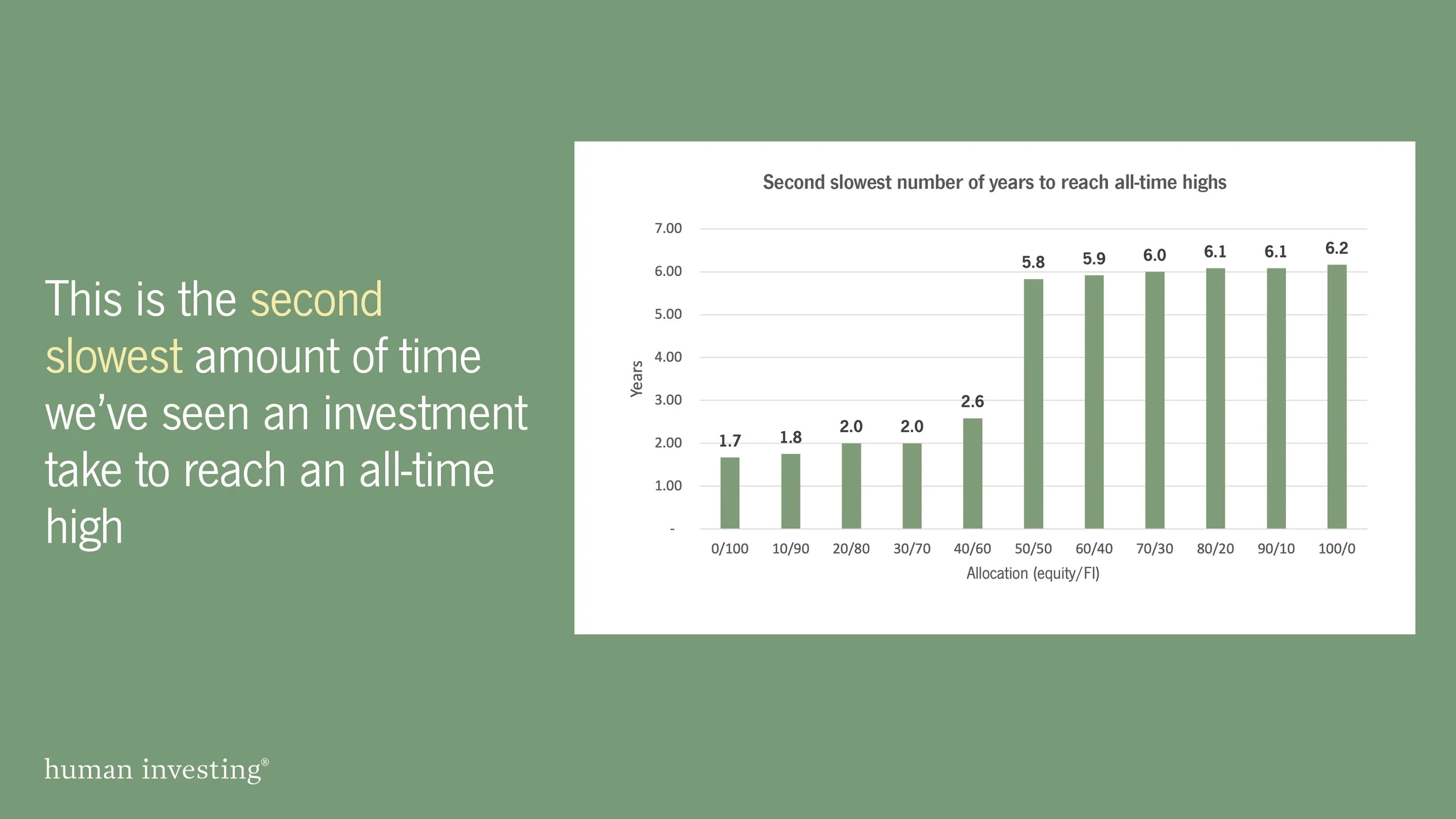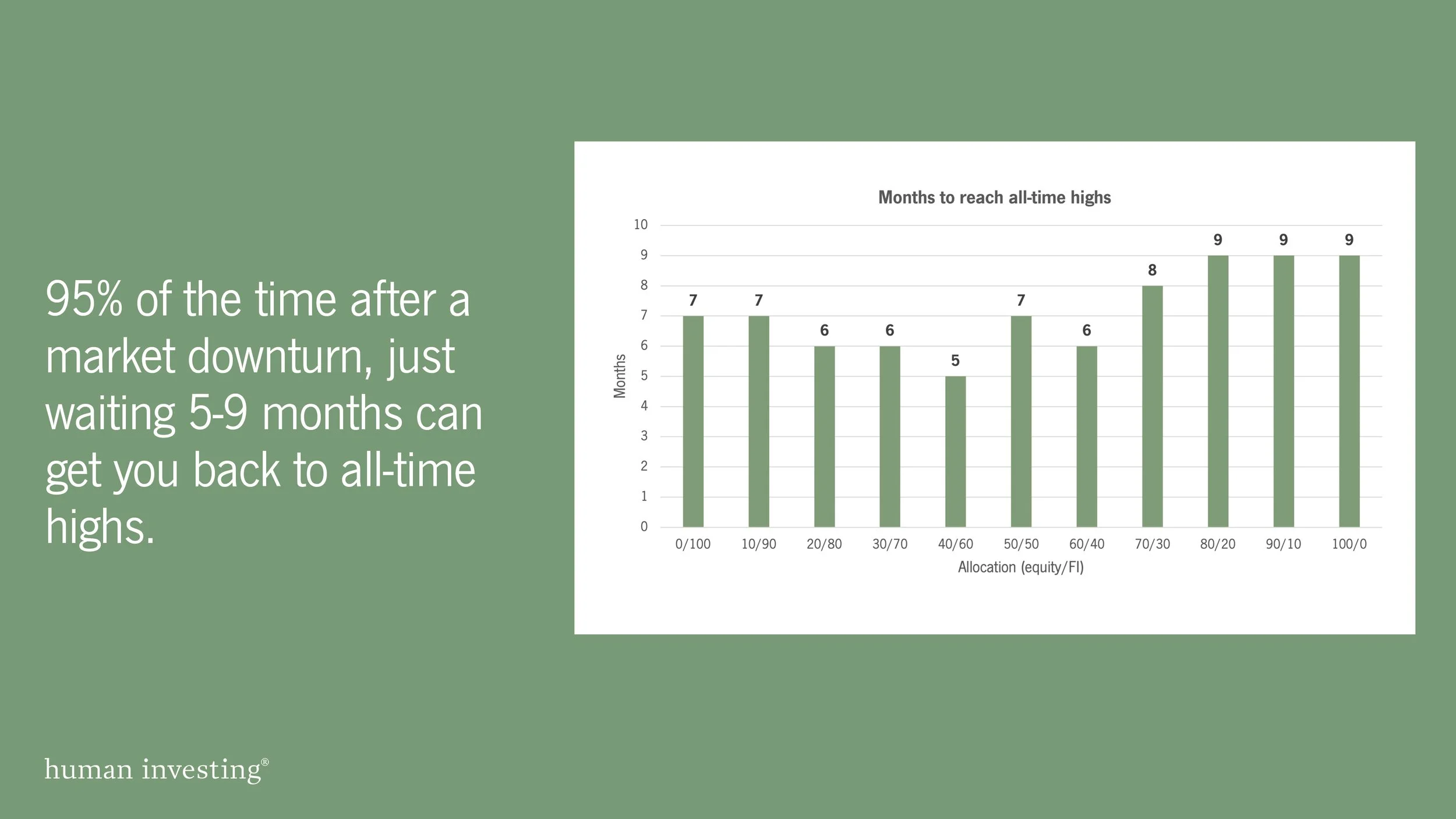Payback Periods: How long to Make your Money Back?
As I write this in May 2022, most major asset classes are down for the year. Stocks, bonds, foreign or domestic, it’s hard to find an investment producing positive returns right now. Since no investor likes to see the balance in their account drop, we have received an uptick in client inquiries about whether it’s worth staying invested. The short answer is yes; we still recommend staying invested. Markets have historically recovered, and grown to new highs. Panicking and selling your investments when they’ve gone down in price is unhelpful for achieving your long-term investment goals. Staying invested when the markets are roiling is easy to say, hard to do.
If you’re interested in a longer, more data driven response about why you should stay invested, keep reading. A lot of client’s concerns boil down to “How long is it going to take for me to make my money back?”. Let’s call this amount of time it takes to hit a new all-time high for a portfolio the “payback period”.
For the returns, I pulled the Ibbotson SBBI US Large-Cap Stocks for equity, and the Ibbotson SBBI US Intermediate-term (5-year) Government Bonds for fixed income. This data compiles the monthly returns from January 1926 to March 2022. I took a 100% equity portfolio (100/0) and added 10% bonds to compare different allocations (i.e. 60/40 is 60% equity 40% fixed income). I assumed monthly rebalancing.
Source: CFA Institute
As the graph shows, the more conservative your allocation, the shorter the time-frame necessary to make your money back. The most aggressive allocations (100/0 and 90/10) can take about 15 years to make your money back. A more balanced investor (40/60 to 80/20) would expect around 7 years as the worst case to make their money back.
I want to emphasize these numbers reflect the absolute worst scenarios over nearly a century of investing. We could always see a new worst case. Typical experiences are usually not as extreme. Even just looking at the 2nd longest time-frame to make your money back, and the longest payback is just over 6 years.
Source: CFA Institute
In most cases, you will make money in a relatively short amount of time if you remain invested. The final graph shows how long your investment horizon needs to be to have made money 95% of the time. As you can see, a majority of the time markets reward investors who stay invested for at least 9 months. That 5% of times where you haven’t made money in 9 months, we have seen some major draw-downs that took years to recover from. Make sure you have positioned yourself in a way where you are comfortable with all possible outcomes.
Source: CFA Institute
So, what do we do with this information? Some perspective for us all:
Understand the time-frame you’re investing for
If you’re not accessing funds for 15+ years, you shouldn’t worry about how long it takes to make the money back.
If you are investing in a retirement account, keep doing that.
If you move money monthly into a brokerage account, keep doing that.
If you are planning on accessing the funds in 10 years or less, consider incorporating bonds in your allocation to reduce risk, and shorten the time frame to recover a loss in value for your portfolio.
If you’re currently accessing your funds, have a financial plan to understand how you handle downturns in the markets and still achieve your financial goals
Strategies for this include having a certain amount of cash on hand to cover market downturns, adjusting your budget as needed, etc.
Stay Invested
When you see your account balance down, know that remaining invested is the best way to recover lost value. Most of the time, you won’t have to wait for years to see your balance recover.
Plan in a way that helps you sleep at night
If you can’t handle the thought of waiting seven years to make your money back, a 70/30 allocation may not be right for you. Have a financial plan in place that accounts for the worst-case scenarios, so you know you’ll be able to ride out any volatility in the markets.
Understand history can only tell us so much
The markets could always find a new worst-case scenario. Use history as a guide for setting expectations, not absolute certainty of what is to come.





